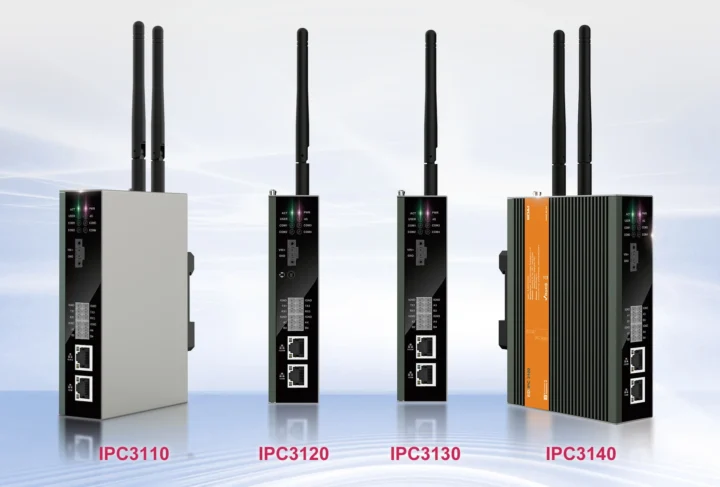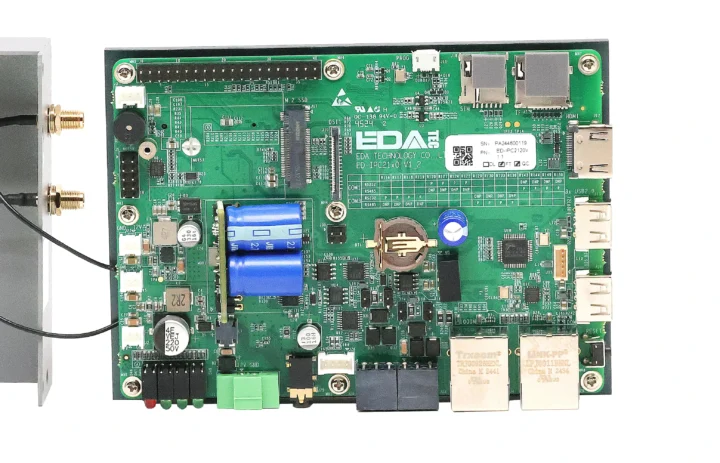EDATEC ED-IPC3100 is a range of four DIN-Rail mountable industrial computers based on the new Raspberry Pi CM5 (Compute Module 5) with two Ethernet ports, and various RS232 or RS485 COM port options depending on the selected model.
The ED-IPC3100 computers are offered with the CM5 with up to 16GB LPDDR5, 64GB eMMC flash, and optional WiFI 5 and Bluetooth 5. All also feature one HDMI port, two USB 2.0 ports, 9V to 36V DC input, and the EDC-IPC3120 model also adds a 3.5mm audio jack and internal connectors for a speaker, MIPI DSI and HDMI video output interfaces, and a MIPI CSI camera.
EDATEC ED-IPC3100 specifications:
- SoM – Raspberry Pi CM5
- SoC – Broadcom BCM2712 quad-core Cortex-A76 processor @ 2.4GHz with VideoCore VII GPU
- System Memory – 2GB, 4GB, 8GB, or 16GB LPDDR4-4267 SDRAM
- Storage – Options for 16GB, 32GB, or 64GB eMMC flash
- Wireless – Optional dual-band WiFi 5 and Bluetooth LE 5.0 module
- Storage
- M.2 Key-B PCIe socket socket optionally fitted with 128GB, 256GB, or 512GB NVMe SSD
- MicroSD card for user storage expansion only (won’t boot the OS)
- 4KB EEPROM
- Video Output
- HDMI 2.0 Type-A port up to 4Kp60
- ED-IPC3120 only
- 40-pin HDMI FPC connector with HDMI 2.0 and USB/I2C touch
- 30-pin MIPI DSI connector
- Audio
- Buzzer
- ED-IPC3120 only
- 3.5mm audio jack with support for stereo playback and microphone input
- 4-pin speaker connector
- Camera I/F – ED-IPC3120 only – 2x 15-pin header for 2-lane MIPI CSI interface
- Networking
- Gigabit Ethernet RJ45 port
- 10/100M Ethernet RJ45 port
- Optional WiFi 5 and Bluetooth 5 via Raspberry Pi CM5 module
- Optional 4G LTE connectivity via mini PCIe module (Quectel EC20 or EC25) and Nano SIM card slot
- 2x SMA connectors for WiFi/Bluetooth antenna for wireless-enabled CM5 modules and optional 4G LTE
- USB
- 2x USB 2.0 ports
- 1x USB micro USB port to flash the OS to the eMMC flash,
- 1x USB 2.0 FPC connector
- Expansion
- 40-pin Raspberry Pi-compatible GPIO connector
- 10-pin GPIO header with 8x GPIOs, 3.3V, GND
- M.2 Key-B connector for 2030/2242 SSD
- Serial via 12-pin Phoenix terminals with electrostatic and surge protection.
-
ED-IPC3110 – 2x RS485 + 2x RS232
- ED-IPC3120 – 2x RS485 + 2x RS232
-
ED-IPC3130 – 3x RS485 + 1x RS232
-
ED-IPC3140 – 4x RS485 (No RS232 interface)
-
- Misc
- Reset button
- Green system LED (ACT), green 4G LED, red power LED, green user LED, 4x green COM1-4 LEDs
- Real-Time Clock (RTC) with 1F SuperCAP backup and CR1220 battery holder
- ATECC608 encryption chip
- Watchdog (not currently supported by software).
- Power Supply
- Input
- 9 to 36V via 2-pin Phoenix terminal with screw holes
- Optional PoE support
- Output
- 1x 5V DC/1A output
- 3x 12V DC/1A outputs
- Consumption – Up to 24 Watts
- Input
- Dimensions – 143 x 100 x 35 to 55 mm depending on the model
- Weight – 750 grams and up
- Temperature Range – Operating: -25 to 60°C; storage: -25 to 60°C
- Humidity – 5% ~ 95% (non-condensing)
- Certifications
- FCC – FCC 47 CFR Part 15 Subpart B
- CE
- EN IEC 62368-1/EN IEC 62311/EN IEC 61000-3-2/EN IEC 61000-3-3
- EN 55032/EN 55035
- EN 301 489-1/EN 301 489-3/EN 301 489-17/EN 301 489-52
- EN 301 328/EN 301 440/EN 301 511/EN 301 908-1/EN 301 908-2
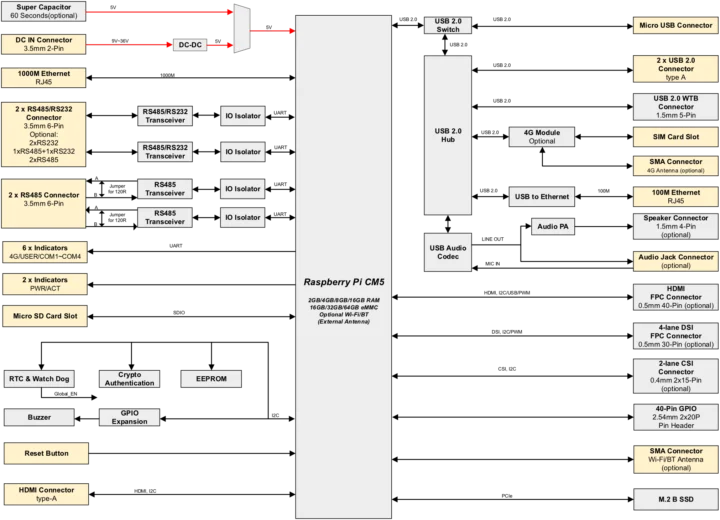
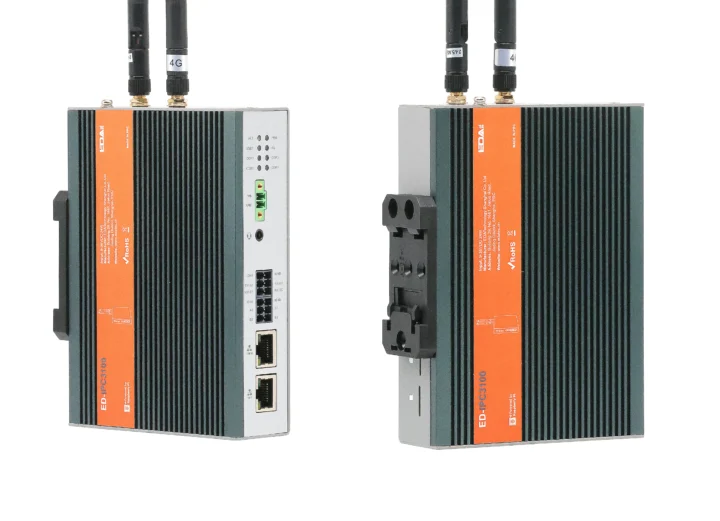
EDATEC provides Raspberry Pi OS 32-bit/64-bit (Desktop/Lite) images including the necessary drivers for the Raspberry Pi CM5-based industrial PCs. We also asked for internal photos of the systems which show the CM5 module installed on the same EDATEC ED-IPC21x0 carrier board used for the previous generation ED-IPC2100 industrial computers based on Raspberry Pi CM4.
Apart from the Raspberry Pi CM4 being replaced by a CM5, the specifications for the ED-IPC3100 industrial computers look identical to the ones for the ED-IPC2100 family. So we asked EDATEC if there were any other differences, and they replied there were only “a few cosmetic differences”.
Samples of the EDATEC ED-IPC3120-10816-4EU and ED-IPC3120-10816-4US with wireless, 8GB RAM, 16GB eMMC flash, and 4G LTE for the EU or US are sold for respectively $280 and $288 on AliExpress excluding shipping. Note that the company offers various other options, but if you need one of the many other variants (see illustration below), you’d need to contact them directly. Additional information may be found on the product page.
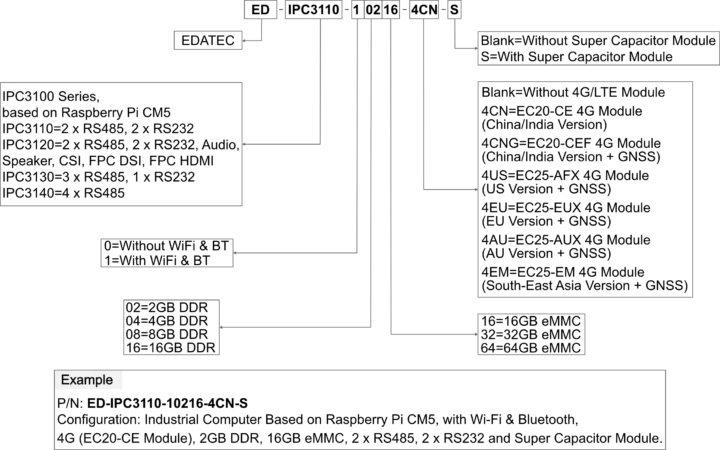

Jean-Luc started CNX Software in 2010 as a part-time endeavor, before quitting his job as a software engineering manager, and starting to write daily news, and reviews full time later in 2011.
Support CNX Software! Donate via cryptocurrencies, become a Patron on Patreon, or purchase goods on Amazon or Aliexpress


